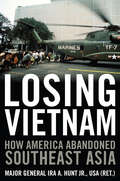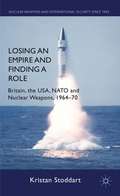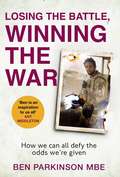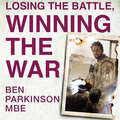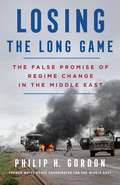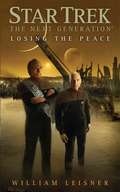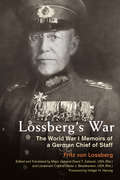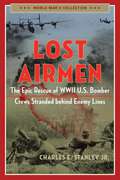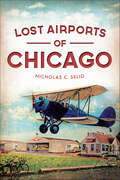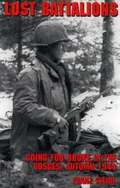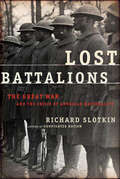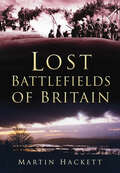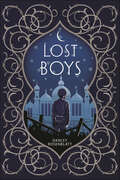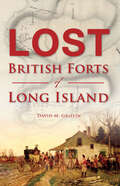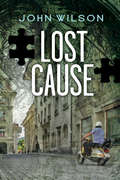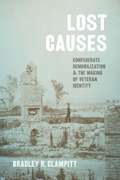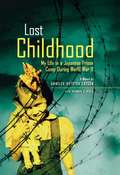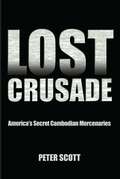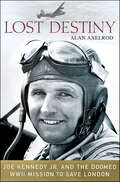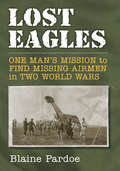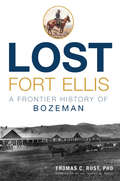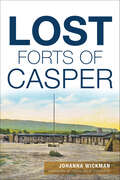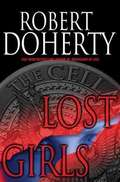- Table View
- List View
Losing Vietnam: How America Abandoned Southeast Asia (Battles and Campaigns)
by Major General Ira A. Hunt Jr.An intelligence officer stationed in Southeast Asia offers a &“detailed, insightful, documented, and authentic account&” of US policy failure in the region (Lewis Sorley, author of Westmoreland). In the early 1970s, the United States began to withdraw combat forces from Southeast Asia. Though the American government promised to support the South Vietnamese and Cambodian forces in their continued fight against the Viet Cong, the funding was drastically reduced over time. The strain on America&’s allies in the region was immense, as Major General Ira Hunt demonstrates in Losing Vietnam. As deputy commander of the United States Support Activities Group Headquarters (USAAG) in Nakhon Phanom, Thailand, Hunt received all Southeast Asia operational reports, reconnaissance information, and electronic intercepts, placing him at the forefront of military intelligence and analysis in the area. He also met frequently with senior military leaders of Cambodia and South Vietnam, contacts who shared their insights and gave him personal accounts of the ground wars raging in the region. In Losing Vietnam, Major Hunt details the catastrophic effects of reduced funding and of conducting "wars by budget." This detailed and fascinating work highlights how analytical studies provided to commanders and staff agencies improved decision making in military operations. By assessing allied capabilities and the strength of enemy operations, Hunt effectively demonstrates that America's lack of financial support and resolve doomed Cambodia and South Vietnam to defeat.
Losing an Empire and Finding a Role
by Kristan StoddartThis book sheds fresh light on developments in British nuclear weapons policy between October 1964, when the Labour Party came back into power under Harold Wilson following a thirteen year absence, and June 1970 when the Conservative government of Edward Heath was elected.
Losing the Battle, Winning the War: How we can all defy the odds we're given
by Ben Parkinson'A great and inspiring book from Doncaster's bravest son. Read it in a day' - Jeremy Clarkson 'Ben is the embodiment of positive thinking. What he has achieved, in large part through willpower, is nothing short of miraculous. An inspiration to us all' - Ant Middleton The story of Ben Parkinson MBE, the most injured soldier to have survived Afghanistan---What were you doing when you were 22? Where were you in the world? What did you want to do with your life? Ben Parkinson was a 6'4" Paratrooper. He was in Afghanistan fighting for his country. He wanted to always be a soldier, to be a father and to get home in one piece. But we don't always get what we want. So the question is: how do we react when that happens? Easy: You find something new to fight for.Ben Parkinson MBE is an inspiration to everyone. He suffered 37 injuries when his Land Rover hit a mine in Helmand in 2006, including brain damage, breaking his back and losing both his legs. This book follows the story of what led him to that moment his life changed forever - and what happened next. Doctors didn't think Ben could survive the trauma - then they didn't think he would wake up, or talk again, or walk again. Time after time, Ben pushed the ceiling on what was possible, going on to carry the Olympic flame in 2012 and receiving an MBE for the enormous feats he has undertaken for charity.What he has achieved in the face of adversity - for others as well as for himself - is nothing short of a miracle. Nerve-wracking, heart-warming and full of classic soldier's humour, Losing the Battle, Winning the War is a book you'll be thinking about long after the last page. 'Ben Parkinson is my hero. His story is one of immeasurable courage and character, a testament to the extraordinary resilience of the human spirit' Dan Jarvis MP, author of Long Way Home
Losing the Battle, Winning the War: How we can all defy the odds we're given
by Ben Parkinson'Ben is the embodiment of positive thinking. What he has achieved, in large part through willpower, is nothing short of miraculous. An inspiration to us all' - Ant Middleton 'A great and inspiring book from Doncaster's bravest son. Read it in a day' - Jeremy Clarkson The story of Ben Parkinson MBE, the most injured soldier to have survived Afghanistan---What were you doing when you were 22? Where were you in the world? What did you want to do with your life? Ben Parkinson was a 6'4" Paratrooper. He was in Afghanistan fighting for his country. He wanted to always be a soldier, to be a father and to get home in one piece. But we don't always get what we want. So the question is: how do we react when that happens? Easy: You find something new to fight for.Ben Parkinson MBE is an inspiration to everyone. He suffered 37 injuries when his Land Rover hit a mine in Helmand in 2006, including brain damage, breaking his back and losing both his legs. This book follows the story of what led him to that moment his life changed forever - and what happened next. Doctors didn't think Ben could survive the trauma - then they didn't think he would wake up, or talk again, or walk again. Time after time, Ben pushed the ceiling on what was possible, going on to carry the Olympic flame in 2012 and receiving an MBE for the enormous feats he has undertaken for charity.What he has achieved in the face of adversity - for others as well as for himself - is nothing short of a miracle. Nerve-wracking, heart-warming and full of classic soldier's humour, Losing the Battle, Winning the War is a book you'll be thinking about long after the last page.
Losing the Battle, Winning the War: The story of the most injured soldier to have survived Afghanistan
by Ben Parkinson'A great and inspiring book from Doncaster's bravest son. Read it in a day' - Jeremy Clarkson 'Ben is the embodiment of positive thinking. What he has achieved, in large part through willpower, is nothing short of miraculous. An inspiration to us all' - Ant Middleton The story of Ben Parkinson MBE, the most injured soldier to have survived Afghanistan---What were you doing when you were 22? Where were you in the world? What did you want to do with your life? Ben Parkinson was a 6'4" Paratrooper. He was in Afghanistan fighting for his country. He wanted to always be a soldier, to be a father and to get home in one piece. But we don't always get what we want. So the question is: how do we react when that happens? Easy: You find something new to fight for.Ben Parkinson MBE is an inspiration to everyone. He suffered 37 injuries when his Land Rover hit a mine in Helmand in 2006, including brain damage, breaking his back and losing both his legs. This book follows the story of what led him to that moment his life changed forever - and what happened next. Doctors didn't think Ben could survive the trauma - then they didn't think he would wake up, or talk again, or walk again. Time after time, Ben pushed the ceiling on what was possible, going on to carry the Olympic flame in 2012 and receiving an MBE for the enormous feats he has undertaken for charity.What he has achieved in the face of adversity - for others as well as for himself - is nothing short of a miracle. Nerve-wracking, heart-warming and full of classic soldier's humour, Losing the Battle, Winning the War is a book you'll be thinking about long after the last page. 'Ben Parkinson is my hero. His story is one of immeasurable courage and character, a testament to the extraordinary resilience of the human spirit' Dan Jarvis MP, author of Long Way Home
Losing the Long Game: The False Promise of Regime Change in the Middle East
by Philip H. GordonThe definitive account of how regime change in the Middle East has proven so tempting to American policymakers for decades—and why it always seems to go wrong."Must reading—by someone who saw it first-hand—for all interested in America’s foreign policy and its place in the world.”—Robin Wright Since the end of World War II, the United States has set out to oust governments in the Middle East on an average of once per decade—in places as diverse as Iran, Iraq, Afghanistan (twice), Egypt, Libya, and Syria. The reasons for these interventions have also been extremely diverse, and the methods by which the United States pursued regime change have likewise been highly varied, ranging from diplomatic pressure alone to outright military invasion and occupation. What is common to all the operations, however, is that they failed to achieve their ultimate goals, produced a range of unintended and even catastrophic consequences, carried heavy financial and human costs, and in many cases left the countries in question worse off than they were before.Philip H. Gordon's Losing the Long Game is a thorough and riveting look at the U.S. experience with regime change over the past seventy years, and an insider’s view on U.S. policymaking in the region at the highest levels. It is the story of repeated U.S. interventions in the region that always started out with high hopes and often the best of intentions, but never turned out well. No future discussion of U.S. policy in the Middle East will be complete without taking into account the lessons of the past, especially at a time of intense domestic polarization and reckoning with America's standing in world.
Losing the Peace (Star Trek: The Next Generation)
by William LeisnerContinuing the events detailed in Star Trek: Destiny: With the displacement and devastation wrought by the Borg, can the Federation survive?Fortune has smiled on Lieutenant Jasminder Choudhury, chief of security on the USS Enterprise. She has survived. But her homeworld, Deneva, one of the planets targeted in the massive Borg invasion, has not. The entire surface has been wiped clean of everything, killing anyone who did not evacuate and rendering the planet uninhabitable. Choudhury is left to wonder whether her family was one of the displaced. Or are they all gone forever? The Enterprise is just one ship, and Jasminder Choudhury is just one officer, yet her story is being repeated over and over across the galaxy. Hundreds of thousands of displaced persons haunt the space ways, seeking comfort, looking for someplace safe, somewhere, anywhere to find solace. Captain Jean-Luc Picard is ordered to do everything he can to rescue and if need be to recover the lost souls from the Borg invasion. For the first time in generations, citizens of the Federation know want, uncertainty, and fear. Bloodied yet unbowed, the Federation now stands on the edge of a precipice. The captain of the Enterprise finds himself in the unenviable position of wondering whether it is true that those who can win a war well can rarely make a good peace.
Lossberg's War: The World War I Memoirs of a German Chief of Staff (Foreign Military Studies)
by Fritz von Lossberg&“This book is a work of detail and scholars can now envision the campaigns and battles of the First World War from a high-level German perspective.&” —Journal of Military History Gen. Fritz von Lossberg (1868-1942) directed virtually all the major German defensive battles on the Western Front during the First World War. Hailed as &“the Lion of the Defensive,&” he was an extremely influential military tactician and, unlike many other operations officers of his era, was quick to grasp the changes wrought by technology. Now available for the first time in English, Lossberg&’s memoir explains how he developed, tested, and implemented his central principles—flexibility, decentralized control, and counterattack—which were based on a need to adapt to shifting conditions on the battlefield. Lossberg first put his theory of elastic defense combined with defense-in-depth into practice during the Battle of Arras (April-May 1917), where it succeeded. At the Battle of Passchendaele (June-November 1917), his achievements on the field proved the feasibility of his strategy of employing a thinly manned front line that minimized the number of soldiers exposed to artillery fire. Lossberg&’s tactical modernizations have become essential components of army doctrine, and Lossberg&’s War: The World War I Memoirs of a German Chief of Staff will take readers inside the mind of one of the most significant military innovators of the twentieth century. &“Make no mistake about it, the appearance of this book is one of the most significant Great War publishing events of the year. It deserves to be on the shelf of every serious student of this titanic conflict.&” —Stand To!
Lost Airmen: The Epic Rescue of WWII U.S. Bomber Crews Stranded Behind Enemy Lines
by Charles E. Stanley Jr.Late in 1944, thirteen U.S. B-24 bomber crews bailed from their cabins over the Yugoslavian wilderness. Bloodied and disoriented after a harrowing strike against the Third Reich, the pilots took refugee with the Partisan underground. But the Americans were far from safety. Holed up in a village barely able to feed its citizens, encircled by Nazis, and left abandoned after a team of British secret agents failed to secure their escape, the airmen were left with little choice. It was either flee or be killed. In The Lost Airmen, Charles Stanely Jr. unveils the shocking true story of his father, Charles Stanely-and the eighteen brave soldiers he journeyed with for the first time. Drawing on over twenty years of research, dozens of interviews, and previously unpublished letters, diaries, and memoirs written by the airmen, Stanley recounts the deadly journey across the blizzard-swept Dinaric Alps during the worst winter of the Twentieth Century-and the heroic men who fought impossible odds to keep their brothers in arms alive.
Lost Airports of Chicago (Lost)
by Nicholas C. SeligTo book a ride on the "World's Shortest Airline" or learn aerial stunts from the redheaded widow of Lawrence Avenue, you've got to go through the airports buried beneath the housing developments and shopping malls of Chicagoland. Many of these airports sprang up after World War I, when training killed more pilots than combat, and the aviation pioneers who developed Chicago's flying fields played a critical role in getting the nation ready to dare the skies in World War II. Author Nick Selig has rolled wheels on his fair share of Chicago's landing strips but faces an entirely new challenge in touching down in places being swallowed by a city and forgotten by history.
Lost Battalions: Going for Broke in the Vosges, Autumn 1944
by Franz SteidlThe story of two World War II battalions--one German, one American--each cut off behind enemy lines in the same forest at the same time, and the heroic efforts to save them.
Lost Battalions: The Great War and the Crisis of American Nationality
by Richard Slotkin"A work of stunning density and penetrating analysis . . . Lost Battalions deploys a narrative symmetry of gratifying complexity."—David Levering Lewis, The NationDuring the bloodiest days of World War I, no soldiers served more valiantly than the African American troops of the 369th Infantry—the fabled Harlem Hellfighters—and the legendary 77th "lost battalion" composed of New York City immigrants. Though these men had lived up to their side of the bargain as loyal American soldiers, the country to which they returned solidified laws and patterns of social behavior that had stigmatized them as second-class citizens.Richard Slotkin takes the pulse of a nation struggling with social inequality during a decisive historical moment, juxtaposing social commentary with battle scenes that display the bravery and solidarity of these men. Enduring grueling maneuvers, and the loss of so many of their brethren, the soldiers in the lost battalions were forever bound by their wartime experience. Both a riveting combat narrative and a brilliant social history, Lost Battalions delivers a richly detailed account of the fierce fight for equality in the shadow of a foreign war.
Lost Battlefields of Britain
by Martin HackettThe British Isles have witnessed hundreds of battles, both great and small, in their two thousand years of recorded history, but not all are widely remembered today. Many of these battles are well known, due to their far-reaching consequences, their sheer scale or the involvement of famous protagonists. Even so, many battles have never been properly investigated, perhaps because their importance was never understood or because they have never been included in previous books on British battlefields.In this book, Martin Hackett examines ten forgotten British battles, covering the length and breadth of Britain and some 900 years of warfare. For each, he provides a concise account of the battle itself and analyses its military, archaeological and political significance. Each entry is accompanied by current photographs of the location, a modern map of the battlefield with suggested tours and information on exploring the site today.
Lost Boys
by Darcey RosenblattBased on historical events, this unforgettable and inspiring tale for middle-grade readers is about a young boy torn from the only life he’s ever known and held captive as a prisoner of war.In 1982, twelve-year-old Reza has no interest in joining Iran’s war effort against Iraq. But in the wake of a tragedy and at his mother’s urging, he decides to enlist, assured by the authorities that he will achieve paradise should he die in service to his country. War does not bring the glory the boys of Iran have been promised, and Reza soon finds himself held in a prisoner-of-war camp in Iraq, where the guards not only threaten violence—they act upon it. Will Reza make it out alive? And if he does, will he even have a home to return to?Friendship, heartbreak, and Reza’s very survival are at stake as he finds solace through music and forges his own path—wherever that might take him.
Lost British Forts of Long Island (Lost Ser.)
by David M GriffinAuthor David M. Griffin uncovers the lost history and harrowing stories of Long Island's British forts.When the Revolutionary War broke out and New York City had fallen in 1776, the forces of the king of Great Britain developed a network of forts along the length of Long Island to defend the New York area and create a front to Patriot forces across the Sound in Connecticut. Fort Franklin on Lloyd's Neck became a refugee camp for Loyalists and saw frequent rebel attacks. In Huntington, a sacred burial ground was desecrated, and Fort Golgotha was erected in its place, using tombstones as baking hearths. In Setauket along the northern shore, the Presbyterian church was commandeered and made the central fortified structure of the town.
Lost Cause (Seven (the Series) #7)
by John WilsonSteve thinks a trip to Europe is out of the question—until he hears his grandfather's will. Suddenly he's off to Spain, armed with only a letter from his grandfather that sends him to a specific address in Barcelona. There he meets a girl named Laia and finds a trunk containing some of his grandfather's possessions, including a journal he kept during the time he fought with the International Brigades in the Spanish Civil War. Steve decides to trace his grandfather's footsteps through Spain, and with Laia's help, he visits the battlefields and ruined towns that shaped his grandfather's young life, and begins to understand the power of history and the transformative nature of passion for a righteous cause. Steve's adventures start in The Missing Skull, part of The Seven Prequels and continue in Broken Arrow, part of The Seven Sequels.
Lost Causes: Confederate Demobilization and the Making of Veteran Identity (Conflicting Worlds: New Dimensions Of The American Civil War Ser.)
by Bradley R. ClampittThis groundbreaking analysis of Confederate demobilization examines the state of mind of Confederate soldiers in the immediate aftermath of war. Having survived severe psychological as well as physical trauma, they now faced the unknown as they headed back home in defeat. Lost Causes analyzes the interlude between soldier and veteran, suggesting that defeat and demobilization actually reinforced Confederate identity as well as public memory of the war and southern resistance to African American civil rights. Intense material shortages and images of the war’s devastation confronted the defeated soldiers-turned-veterans as they returned home to a revolutionized society. Their thoughts upon homecoming turned to immediate economic survival, a radically altered relationship with freedpeople, and life under Yankee rule—all against the backdrop of fearful uncertainty. Bradley R. Clampitt argues that the experiences of returning soldiers helped establish the ideological underpinnings of the Lost Cause and create an identity based upon shared suffering and sacrifice, a pervasive commitment to white supremacy, and an aversion to Federal rule and all things northern. As Lost Causes reveals, most Confederate veterans remained diehard Rebels despite demobilization and the demise of the Confederate States of America.
Lost Childhood: My Life in a Japanese Prison Camp During World War II
by Herman J. Viola Annelex Hofstra LaysonA MYSTERIOUS TELEPHONE CALL, AN EARTHQUAKE, JAPANESE FIGHTER PLANES, AND A DEADLY EXPLOSION . . . It was a day unlike any other that four-year-old Annelex Hofstra had ever experienced. It turned her comfortable, carefree world upside-down and forever changed her life. Immediately after invading the island of Java, in the Dutch East Indies (now Indonesia), the Japanese began rounding up all the Dutch citizens, stripping them of all but the barest necessities, and shipping them off to prison camps. Lost Childhood is a vivid real-life account of how a little Dutch girl, along with her mother and grandmother, managed to survive the horrors of life in these camps during World War II. For three and a half years they were treated as less than human by their captors and lived in a state of constant fear--fear of being punished, of being separated from each other, of starvation, and of dying from infection, malaria, or some other dreaded disease. The Allied victory in 1945 opened the prison gates but did nothing to erase the mental and physical damage caused by life in the camps. For 60 years the author has kept her silence, dealing with her past pain by pushing memories of it to the furthest reaches of her mind. Now she wants to share her story not only to honor all who suffered or died in the camps but also to encourage anyone who feels frightened, trapped, abused, or abandoned to never give up hope.
Lost Colony: The Untold Story of China's First Great Victory over the West
by Tonio AndradeHow a Chinese pirate defeated European colonialists and won Taiwan during the seventeenth centuryDuring the seventeenth century, Holland created the world's most dynamic colonial empire, outcompeting the British and capturing Spanish and Portuguese colonies. Yet, in the Sino-Dutch War—Europe's first war with China—the Dutch met their match in a colorful Chinese warlord named Koxinga. Part samurai, part pirate, he led his generals to victory over the Dutch and captured one of their largest and richest colonies—Taiwan. How did he do it? Examining the strengths and weaknesses of European and Chinese military techniques during the period, Lost Colony provides a balanced new perspective on long-held assumptions about Western power, Chinese might, and the nature of war.It has traditionally been asserted that Europeans of the era possessed more advanced science, technology, and political structures than their Eastern counterparts, but historians have recently contested this view, arguing that many parts of Asia developed on pace with Europe until 1800. While Lost Colony shows that the Dutch did indeed possess a technological edge thanks to the Renaissance fort and the broadside sailing ship, that edge was neutralized by the formidable Chinese military leadership. Thanks to a rich heritage of ancient war wisdom, Koxinga and his generals outfoxed the Dutch at every turn.Exploring a period when the military balance between Europe and China was closer than at any other point in modern history, Lost Colony reassesses an important chapter in world history and offers valuable and surprising lessons for contemporary times.
Lost Crusade
by Peter ScottWhen Peter Scott began a 1968 tour in Vietnam advising ethnic Cambodian Khmer Krom paramilitaries, they shared only an earnest desire to check the spread of communism. It took nearly thirty years and a chance reunion for him to realize just how much they had become a part of him. Successfully blending intense combat narrative and stirring emotional drama, Scott vividly captures both the unique village culture of a little-known, highly spiritual people and their complex relationship with Special Forces soldiers, who found it increasingly difficult to match their charges' commitment to the costly conflict. Building on his experiences as a Phoenix Program adviser near the Cambodian border, extensive interviews with Khmer Krom survivors, hundreds of hours of research in government archives, and requests for Freedom of Information Act disclosures, Scott seamlessly reconstructs the six-thousand-strong mercenary force's final crusade against communism, beginning in their ancestral home in 1970 and ending on the U.S. West Coast in 1995.
Lost Destiny: Joe Kennedy Jr. and the Doomed WWII Mission to Save London
by Alan AxelrodAlan Axelrod's Lost Destiny is a rare exploration of the origin of today's controversial military drones as well as a searing and unforgettable story of heroism, WWII, and the Kennedy dynasty that might have been.On August 12, 1944, Lieutenant Joseph P. Kennedy, Jr., heir to one of America's most glamorous fortunes, son of the disgraced former ambassador to Great Britain, and big brother to freshly minted PT-109 hero JFK, hoisted himself up into a highly modified B-24 Liberator bomber. The munitions he was carrying that day were fifty percent more powerful than TNT.Kennedy's mission was part of Operation Aphrodite/Project Anvil, a desperate American effort to rescue London from a rain of German V-1 and V-2 missiles. The decision to use these bold but crude precursors to modern-day drones against German V-weapon launch sites came from Air Corps high command. Lieutenant General Jimmy Doolittle, daring leader of the spectacular 1942 Tokyo Raid, and others concocted a plan to install radio control equipment in "war-weary" bombers, pack them with a dozen tons of high explosives, and fly them by remote control directly into the concrete German launch sites—targets too hard to be destroyed by conventional bombs. The catch was that live pilots were needed to get these flying bombs off the ground and headed toward their targets. Joe Jr. was the first naval aviator to fly such a mission. And—in the biggest manmade explosion before Hiroshima—it killed him.
Lost Eagles: One Man's Mission to Find Missing Airmen in Two World Wars
by Blaine PardoePraise forLost Eagles "The pilot and observer stories selected have not previously seen much exposure. Not only are they interesting, but I found myself relishing getting to the next chapter to find out what Frederick Zinn was doing during the next stage of his life. " ---Alan Roesler, founding member, League of World War I Aviation Historians, and former Managing Editor,Over the Front Praise for Blaine Pardoe's previous military histories (which average 4. 5-star customer reviews on Amazon. com): Terror of the Autumn Skies: The True Story of Frank Luke, America's Rogue Ace of World War I "This painstaking biography of World War I ace Frank Luke will earn Pardoe kudos . . . Pardoe has flown a very straight course in researching and recounting Luke's myth-ridden life. . . . Thorough annotation makes the book that much more valuable to WWI aviation scholars as well as for more casual air-combat buffs. " ---Booklist The Cruise of the Sea Eagle: The Amazing True Story of Imperial Germany's Gentleman Pirate "This is a gem of a story, well told, and nicely laid out with photos, maps, and charts that cleverly illuminate the lost era of 'gentlemen pirates' at sea . . . [German commerce raider Felix von Luckner's] legend lives on in this lively and readable biography. " ---Admiral James Stavridis, U. S. Navy, Naval History Few people have ever heard of Frederick Zinn, yet even today airmen's families are touched by this man and the work he performed in both world wars. Zinn created the techniques still in use to determine the final fate of airmen missing in action. The last line of the Air Force Creed reads, "We will leave no airman behind. " Zinn made that promise possible. Blaine Pardoe weaves together the complex story of a man who brought peace and closure to countless families who lost airmen during both world wars. His lasting contribution to warfare was a combination of his methodology for locating the remains of missing pilots (known as the Zinn system) and his innovation of imprinting all aircraft parts with the same serial number so that if a wreck was located, the crewman could be identified. The tradition he established for seeking and recovering airmen is carried on to this day. Blaine Pardoe is an accomplished author who has published dozens of military fiction novels and other books, including the widely acclaimedCubicle Warfare: Self-Defense Tactics for Today's Hypercompetitive Workplace;Terror of the Autumn Skies: The True Story of Frank Luke, America's Rogue Ace of World War I;andThe Cruise of the Sea Eagle: The Amazing True Story of Imperial Germany's Gentleman Pirate. Jacket photo: Frederick Zinn's Sopwith aircraft, which crashed during World War I. National Museum of the United States Air Force Archives.
Lost Fort Ellis: A Frontier History of Bozeman (Lost)
by Thomas C. Rust Dr Harry FritzEstablished in 1867 in the Gallatin Valley of Montana, Fort Ellis played a key role in the development of the Montana frontier. From post commanders attacking the town to restoring order when riotous mobs got out of control, explore the ambivalent, albeit contentious, relationship from 1867 to 1886 between the civilians and soldiers in whimsical but dramatic fashion. Competing visions of economic and military conditions on the frontier led to a complex relationship that has all the drama of a Hollywood western. Join MSU-Billings history professor Dr. Thomas C. Rust as he examines the fort's impact on the social and economic development of early Bozeman, the problems of military command and the dynamics of the soldier-civilian interaction on Montana's frontier.
Lost Forts of Casper (Lost)
by Johanna WickmanThree army outposts built before and during the Civil War protected critical routes along the western trails at the North Platte River near what later became Casper. All had been abandoned by 1867, and their dramatic stories are mostly forgotten. The Post at Platte Bridge was a vital outpost on Albert Sidney Johnston's Utah War supply route. Camp Dodge and Platte Bridge Station, also called Fort Caspar, guarded telegraph lines from Native American sabotage. Violent winds, horrendous blizzards and scorching summers made life miserable. Tension reached a fever pitch at the Battle of Platte Bridge when Sioux, Cheyenne and Arapaho attacked a cavalry detachment led by Caspar Collins. Today, a reconstructed Fort Caspar stands as a vigilant reminder of the struggles at those lonely frontier stations. Local historian Johanna Wickman chronicles military efforts to keep the peace, wage war and merely survive.
Lost Girls
by Robert DohertyAfter World War II and the emergence of the United States as the leading world power, one single man was chosen to create an agency known as The Cellar to police all the other agencies as they formed (CIA, FBI, ATF, DEA, etc.). With its founder on his deathbed, a new face is commanding the Cellar: Hannah Masterson. Her first task may prove to be the most harrowing of her career. Deep in the forests of Kentucky, a girl is being held captive. In Alabama, a young pre-school teacher is murdered in front of her students. In the panhandle of Florida, a college undergrad is kidnapped from a nightclub These seemingly unrelated crimes catch the eye of the Cellar and trigger a most intense and frightening investigation. Cellar operatives Jack and Neeley are chosen to track down those responsible. Enlisting the help of profiler Susan Golden, the three-person team is dragged up and down the Eastern Coast of the US, following a trail of caches into a vicious trap. The men responsible aren't your ordinary criminals. They are highly trained Special Forces Sniper Team, and their crimes ignite an intricate plan of revenge. But as is always the case with the Cellar, nothing can be taken for granted. Underneath this web of deceit lies an even more shocking crime--a conspiracy that men of power will sacrifice their lives and the lives of their families to protect.
